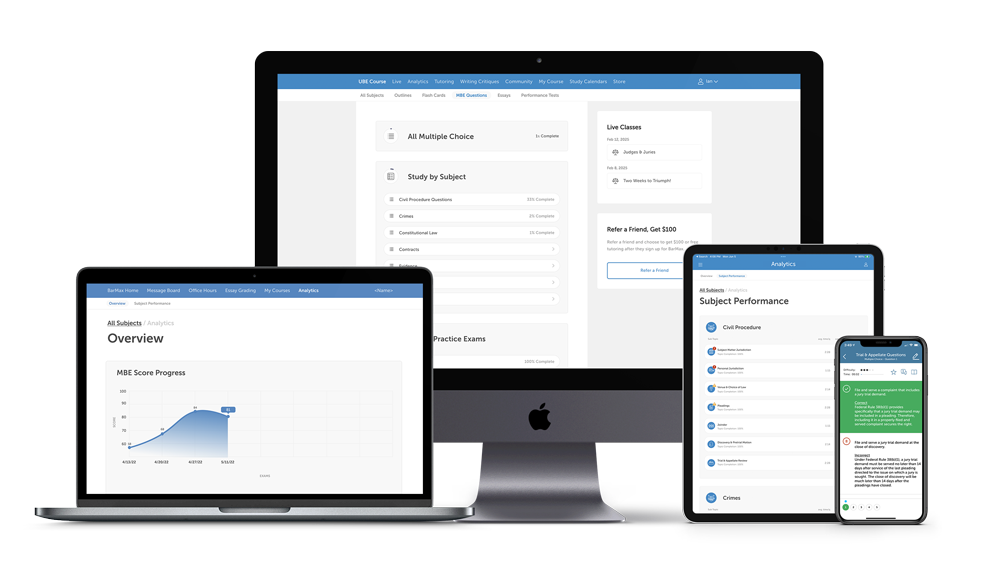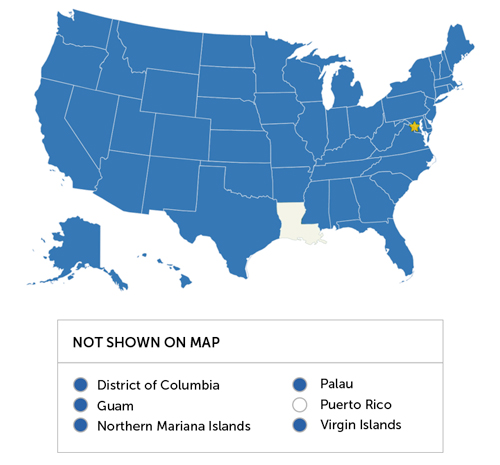1,950+ Real MBE Questions
Official NCBE-licensed questions from past bar exams — including OPE 1-4 and the MBE Study Aid. No fakes or simulations.

Access official NCBE-licensed questions with full explanations and analytics — online or in-app — so you can prep on your schedule, not someone else's.
Built by Harvard Law School alumni. Trusted by thousands of successful bar takers.
Everything you need to master the MBE — built for busy law students and professionals.
Official NCBE-licensed questions from past bar exams — including OPE 1-4 and the MBE Study Aid. No fakes or simulations.

Every answer choice is broken down so you understand not just what's correct, but why — reinforcing key legal principles.

Smart performance tracking identifies your weak spots and strengths, helping you focus study time where it matters most.

Practice online or offline across all devices. Your progress syncs automatically — perfect for busy schedules.
Designed by Harvard Law graduates with years of bar exam teaching experience and proven success.
Instant access, lifetime availability, and 0% financing options with payments as low as $20/month.

Traditional bar prep forces you to adapt to their rigid systems. BarMax adapts to you.
Thousands of students have used BarMax's real MBE questions to pass the bar exam. Here's what they achieved:
"In the past I used BarBri, Emmanuel's, Kaplan... I found BarMax and it finally worked! I improved my MBE score more than 15 points."

"I said goodbye to my 'fake' BarBri MBE questions and focused on doing BarMax MBEs as often as I could. I was able to raise my MBE score 20% by the end of the first week."

"I work 50+ hours a week with a one hour commute and two toddlers. I listened to lectures during my commute and did practice questions a couple hours a week. I scored a 167.2 on the MBE and a 316 on the UBE."

"The real MBE exam questions turned out to be wonderful practice and prediction for the real questions and exam."

"I also loved having real MBE questions that were available on my phone, tablet and online anywhere I had an internet connection which meant I could sneak in questions just about anywhere."

"The way the MBE practice questions are laid out ensures that you understand why you got certain questions wrong and forces you to go back and tackle your weak areas."

Get instant access to 1,950+ real MBE questions, detailed explanations, and lifetime access — all for $395.
Purchase NowQuestions? See our FAQ →
Every state, except for Louisiana, administers the Multistate Bar Exam (MBE) on the last Wednesday of February and last Wednesday of July every year.

The MBE consists of 200 multiple-choice questions, 100 of which are administered in the morning and 100 of which are administered in the afternoon. You will have e hours to complete each of these 100-question sessions. Of the 200 questions, 175 are scored and 25 questions are unscored pretest questions.
The 175 scored questions are distributed evenly with 25 questions from each of the seven tested subject areas:
The difference is that the MBE is merely a part of the UBE.
The UBE consists of the MBE, MEE or Multistate Essays, and MPT or Multistate Performance Tests.
The National Conference of Bar Examiners (NCBE) scores the MBE portion while jurisdictions score the MEE and MPT portions. The MEE and MPT are scaled to the MBE and the NCBE calculates an applicant’s total score.
The MBE is weighted 50%, the MEE 30% and the MPT 20%.
UBE total scores are reported on a scale of 400.
You will encounter multiple-choice questions with four answer choice options. You should select the BEST answer of the four answer options provided.
Each MBE question is supposed to be answered according to “generally accepted fundamental legal principles, unless noted otherwise in the question.”
Your score is entirely based on the number of questions you answer correctly. No points are deducted for incorrect answer choices.
Here is an example of a real MBE question from a previous bar exam:
A father lived with his son, who was an alcoholic. When drunk, the son often became violent and physically abused his father. As a result, the father always lived in fear. One night, the father heard his son on the front stoop making loud obscene remarks. The father was certain that his son was drunk and was terrified that he would be physically beaten again. In his fear, he bolted the front door and took out a revolver. When the son discovered that the door was bolted, he kicked it down. As the son burst through the front door, his father shot him four times in the chest, killing him. In fact, the son was not under the influence of alcohol or any drug and did not intend to harm his father.
At trial, the father presented the above facts and asked the judge to instruct the jury on self-defense.
How should the judge instruct the jury with respect to self-defense?
- Give the self-defense instruction, because it expresses the defense’s theory of the case.
- Give the self-defense instruction, because the evidence is sufficient to raise the defense.
- Deny the self-defense instruction, because the father was not in imminent danger from his son.
- Deny the self-defense instruction, because the father used excessive force.